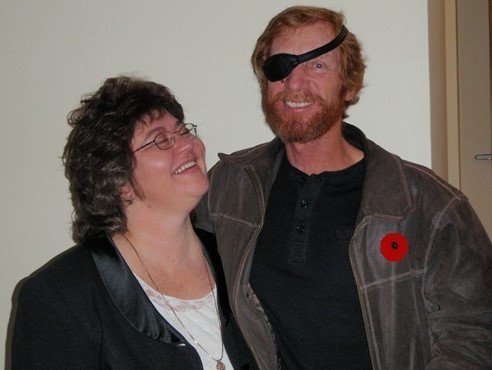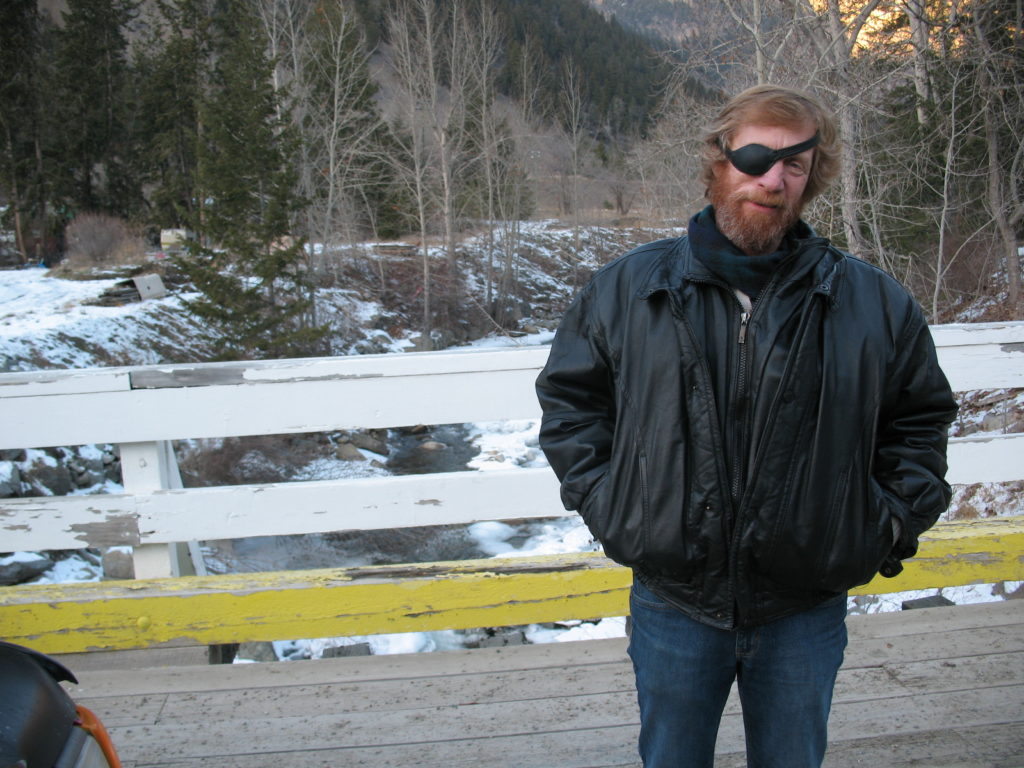
A black patch over his right eye gives Terry Regier a rakish pirate-like appearance. Add to that the black leather jacket, some facial hair and a distinctive, somewhat jaunty gait and we might suppose he had just disembarked from Captain Hook’s “Jolly Roger”. Behind the outer image is an experience that could have devastated his marriage, his family, even his own life. After a conversation with him over coffee and Linda’s brownies in the sun room of our home, I concluded Terry and wife Cindy are two of the most resilient, persevering individuals I’ve ever met. For them there was a life before the patch and another life after.
At the outset of our conversation, Terry’s mind seemed to slip into an earlier time when all was still well. “I was born in Walkerton Ontario,” he began. “In my last year of high school I took carpentry and architectural drafting. When work became hard to find, 3 guys and myself travelled to the west. Our goal was to find jobs before our money ran out. My money did run out, but then someone offered me work in Alberta.”
Meeting Cindy, a young woman with a cheerful personality and a winning smile, added a positive dimension to his life. They got married, bought some land and began a family.
Hired to work on a railroad section gang, he watched for job openings with higher seniority. “Often no one wanted these positions because they didn’t want to move,” he said. “I was willing to work away from home. I stayed in motels, and sometimes in a tent.” He was ambitious and did whatever was needed to improve their circumstances.
Terry was at work on his railroad job when their happy world crashed. “I had been experiencing severe headaches,” he recalled. “On May 15, 1989 I lost my balance and fell to the ground. My co-workers dragged me to a truck and drove me to the hospital in High River.”
He was paralyzed on one side and the doctors at first thought he’d had a stroke. “I had difficulty talking,” he said. “My brain was swelling on one side and this put pressure on the other side. They performed surgery to relieve the pressure. The doctors figured out it was all from an aneurysm.” He was only 28.
For Cindy it was a traumatic time. They lived on acreage and she needed to feed the hogs and chickens, plus look after 2 year old Jesse and one month old Jacob. Added to this they were in the midst of selling the property and buying a quarter section.
“I wanted to farm,” Terry said, “but now I couldn’t read the document the lawyer brought to the hospital for me to sign. I didn’t recognize Cindy or my 2 young sons. Altogether, I was in the hospital 3 months. I had to learn to talk again and to walk. When I was released from the hospital we drove to Calgary, an hour from our farm, every second day for physio. We also needed to figure out our financial situation. It was a horrible time.”
Some women might have walked away from a man whose body and mind were in such a chaotic state. Fortunately Cindy had staying power and didn’t throw up her hands in defeat. “She began training to be a nurse,” Terry said,.“It was a matter of necessity. I was making progress in recuperating, but it was very difficult.”
Although his physical capacity was limited and he’d lost much of his memory, Terry persisted in his dream. “After we bought the quarter section,” he said, “I began buying cheap used equipment for our little farm. It was equipment no one else wanted. I was able to adapt and make it work. We had sheep, chickens, cattle and a garden. I wasn’t a good farmer but the place supplied our needs.”

At this point Terry reached for a brownie and Linda replenished his coffee. “The patch is to prevent double vision,” he said, as though to explain it’s not a big deal for him. “We have 3 adult sons now. I’m a director at the Community Club and Cindy is treasurer. I put the coffee on for the morning coffee group. I also play crib several evenings each week. Cindy plays the piano at the little church here.”
Terry and Cindy endured the dark days together, and beat the odds. Now life is good again.

